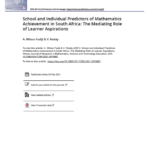School and Individual Predictors of Mathematics Achievement in South Africa: The Mediating Role of Learner Aspirations

Extant literature has demonstrated the importance of individual and school-related factors in improving mathematics achievement. Despite this, there is still a gap in research to understand the mediating role of educational aspiration in mathematics achievement. The aim of the present study is to test the relationship between self-efficacy, school resources, positive school climate and mathematics achievement as mediated by learner aspirations. Using a nationally representative sample of 12,514 learners from the Trends in International Mathematics and Science Study and structural equation modelling, we determined the model fit of a mediated relationship between self-efficacy, school resources, positive school climate and mathematics achievement. Findings from the structural equation modelling in addition to good fit indices revealed that self-efficacy, learner aspiration and school resources were positively related to mathematics achievement. However, there was an unexpected negative relationship between positive school climate and achievement. Learner educational aspirations mediated the relationship between positive self-efficacy, positive school climate with achievement. In order to improve educational achievement, interventions must include both the school and individual factors where interactions between positive self-efficacy and aspirations contribute to improved learner achievement.
